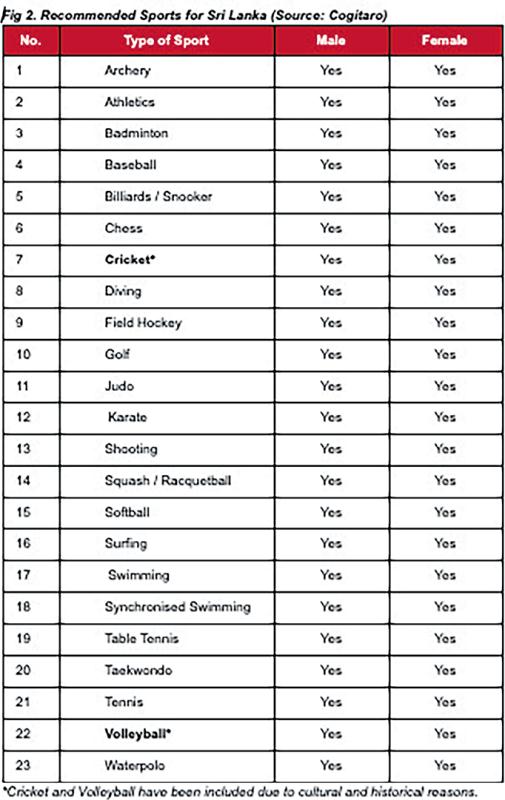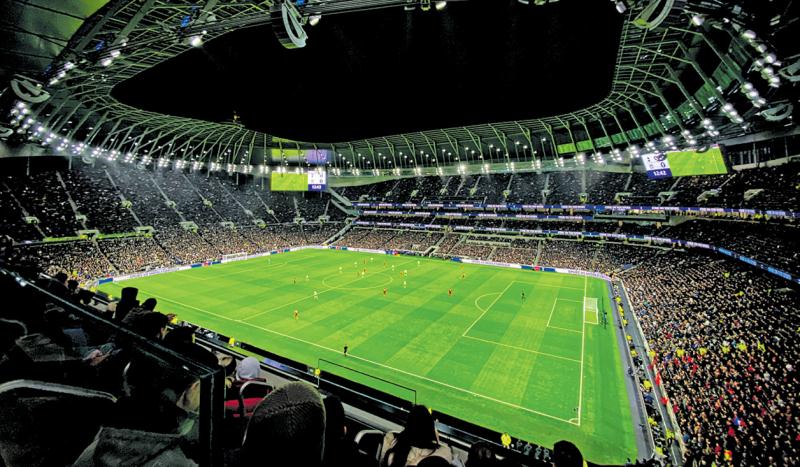Duncan White won silver at the 1948 Olympics; it took more than half a century before Susanthika Jayasinghe picked up SriLanka’s next and only other Olympic medal. Two silver medals in 72 years of Olympic competition. M.J.M. Lafir won the World Snooker Championship in 1974, but that was a flash in the pan. Our cricket team dominated over a 15-year period starting in 1996, winning the World Cup and the T-20 World Cup, but has since then consistently fallen on hard times.
Sport around the world is no longer for amateurs. It’s big business, and also builds a nation’s competitiveness, national pride, ability to face challenges, teamwork, leadership skills, and innovation, lowers health costs, and much more. Success in sports is a key factor in building a nation’s global brand, leading to enhanced prospects for investment and tourism.
It’s time Sri Lanka took a rational approach to sports as a whole, instead of the piecemeal approach that has dominated since Independence.
The global sports industry in 2018 was worth Rs. 87 trillion ($ 471 billion) and is growing faster than global economic growth (source: Statista). Media rights, sponsorships, ticketing, memorabilia, food – all are part of the industry. Sports has a major impact on a country’s travel and tourism revenue. The 2020 Tokyo Olympics (postponed to 2021 due to Covid) is scheduled to have 156 different medal events in 29 sports. A further 102 events were held at the 2018 Winter Olympics. Finland is one of the most successful nations at the Olympics, winning 101 gold medals with a population of just 5.5 million people. Bangladesh, with a population of 170 million, has never won any medals despite competing in nine Olympics. Bermuda, with a population of 61,000, is the smallest nation to earn an Olympic medal.
The importance of sports
Sports isn’t about winning and losing anymore. It’s a global industry, as shown in Figure 1.
In addition, there are now a vast number of reasons that sports is important to any country. These include:
•Success in sports is a global indicator of a country’s success
•Builds national pride
•Builds a nation’s competitiveness through learning of teamwork, responsibility, teambuilding, hard work, innovation, etc.
•Reduces absenteeism from work and school
•Increases lifespan
•Builds the health of society by reducing obesity, heart disease, etc.
•Reduces a country’s health budgets
•Builds a more disciplined society
•Teaches values to children and gives them role models to follow
•Is an excellent source for social networking
•Provides entertainment for billions of people
•Provides employment for millions
•Brings inforeign and local investment and boosts economic growth
How successful is Sri Lanka at sports?

The scale of the population of a nation can play a crucial role in sports success. The greater the population, the bigger the pool of talent and the more opportunities for training and competitions. But, while countries such as the US, China, and Russia win large numbers of medals, greater success has been achieved by many smaller nations.
One international system of judging a country’s success is to multiply a country’s population by its income per capita, and then divide that by the number of Olympic medals it has won.
Economics of sports quantified in Singapore
The City Report 2018 in Singapore estimated sports to be worth $ 22.2 billion a year in three cities (London, Auckland, and Singapore), examining how sport and fitness have generated value in three areas: economics, health, and social affairs.
Sports and physical activity in Singapore have shown an expected annual savings of SGD 454 million and have caused an additional 19,800 years of healthy living per year among the population. Sport and physical activity contribute approximately SGD 3.9 billion on the economic front and provide Singapore with 33,000 jobs.
Importance of sports for the younger generation
For students of all ages, it is necessary to engage in extracurricular activities, but more so for middle and high school children. The middle school years of your child can be difficult, and sports can be a great asset during this period. A recent study showed that student athletes have higher average marks and a 10% higher high school graduation rate.
Which sports? A rational approach
Many countries continue to promote and invest in sports that have been traditionally played there, while the introduction of new sports is heavily influenced by global media and the popularity of particular sports, globally or in countries with high visibility. But these are usually not the best sports for a country to concentrate on.
The authors recommend that countries such as Sri Lanka should use the following 16 rational variables to determine which sports to concentrate their resources on:
•International sports – to suit a country’s international aspirations
•Children’s sports – teach kids basic values
•Youth sports – develop values and enhance skills toward professional sports
•Social sports – for working adults to stay fit and socialise
•Elderly sports – for retired persons to socialise
•Health and longevity
•Available investment and financing
•Cultural affinity to particular sports (e.g. in Sri Lanka: cricket, volleyball)
•Average national physical characteristics – height, weight, body type
•Participation of women
•Games of skill (e.g. archery, martial arts, climbing, shooting)
•Games of physical stamina (e.g. athletics)
•Games of mental ability (e.g. chess)
•Climate of the country
•Available coaching expertise
•Possibilities of mass participation
Recommended sports for Sri Lanka
The authors have used the above criteria to recommend the sports in Figure 2.

Current issues in Sri Lankan sports
Lack of infrastructure and underutilisation: Many of our sports lack infrastructure facilities, while there are some stadiums such as Sooriyawewa and Dambulla that are underutilised. The relevant authorities need to optimise utilisation of the existing facilities.
Mismanagement and corruption: Corruption in sports administration has become endemic in Sri Lanka. Whether it’s cricket or another sport, many Sri Lankan sports associations have been tainted by corruption allegations.
Doping: Drug and steroid use is a major threat among Sri Lankan sportspersons. A zero-tolerance policy needs to be implemented in this regard, with massive awareness creation programmes. The sources of such drugs should be investigated.
Sports Act/policy: The formulation and implementation of an effective policy is central to the growth of any industry, including sports. Necessary changes need to be made rapidly.
Budget for sports: In Sri Lanka, the distribution of financial resources is inadequate compared to other developed and developing countries. This aspect should be looked at from a 360-degree view that should include benefits to the economy and the health of the population.
Inadequate coaching expertise: A dearth of qualified coaches in most sports has been made worse by those who qualify being underpaid and choosing to migrate for greater opportunities.
Financing for sports: Too many sports and sportspersons lack adequate financial support.
Schools/talent pool: Many outstation schools don’t promote sports due to lack of knowledge, coaches, and infrastructure.

Coaching: Sri Lanka has a large number of athletes in its pool and their talents must be thoroughly evaluated before they are introduced to higher levels.
International events: The hosting of international events brings fame to a country, but often comes at a tremendous infrastructure cost. Such investments must be made keeping in mind the need to utilise such infrastructure for schools and clubs afterwards.
The way forward – a practical solution
Identify the sports that Sri Lanka should concentrate on: Don’t be afraid to launch new sports in the country. Consider all the factors mentioned in the above model.
Women: The Ministry should enforce a policy on all sports institutions (clubs, schools, associations) requiring equal opportunity for participation by women.
Indoor sports: Like it or not, many Sri Lankan parents want fair-skinned daughters and daughters-in-law. So do many men. So we need indoor facilities for women’s sports, as long as this ridiculous fair-skinned culture persists.
Career paths for sportspersons: Sports careers are short, with fitness dropping after one reaches mid-30s. Their futures must be assured through coaching qualifications, other employment opportunities, pensions, etc.
Esports: A fast growing industry, esports is played by hundreds of millions of people and the International Olympic Committee continues to give serious consideration to recognising it. It is heavily male-dominated and played predominantly by teens and youths.
Financing/marketing: The Ministry of Sports should create a separate department to explore new avenues of sourcing funds.
Coaching and sports schools: Secondary schools of sports specialists are essential for the promotion and development of young talents in the nation. By offering equipment, facilities, professional coaching, and other vital resources, they facilitate the production of world-class athletes and sports professionals.
Online coaching: Hiring a qualified coach in any sport is an expensive business. But there’s an enormous amount of coaching material on the internet, especially YouTube. Centralised coaches can also provide online coaching.
Social sports: Sports are not just for the young and fit. It is a vital aspect in the lives of retired/elderly persons.
Training centres: In each city, sports institutes and professional coaches of all kinds must be qualified for all sports, so that people are inspired and don’t waste their skills. They will at least have a livelihood, on the other hand parents could at least be pleased with the minimum in their child’s sporting career, and even sportsmen would be encouraged to take advantage of their talent in the future. If there is a training centre in every city, the mindset of people in favour of sport will change.
Professional leagues:Larger sports already have professional leagues but many small sports don’t. One sure way to popularise any sport would be to organise a professional or amateur league for that sport.
Education/policymakers: The Education Ministry should make it mandatory to include each student in at least one sport, a club, and an appropriate organisational activity to promote individual talents and interests and to develop leadership skills. Private sector collaboration should be sought for assistance.
University entrance and government job opportunities: At present, participation in sports receives little importance as criteria in university entrance and government employment, a situation that should be changed at the policy level.

Private sector participation: Sports clubs, health clubs, sports associations, neighbourhood societies, corporates…The list of entities that can be harnessed for the support and participation in sports is long and can be used as valuable assets.
Sports science degree programmes: In order to optimise performance and reduce the risk of injury, sports professionals must learn physiology, psychology, neurophysiology, biochemistry, psychophysiology, and much more. Our national universities should create separate departments for sports sciences.
Conclusion
The sports administration in Sri Lanka is mainly dominated by a few sports where associations are controlled by former sportsmen of that particular sport and/or businessmen. We believe a more rational approach is necessary to serve the nation’s needs instead of limiting to the needs of a few. Utilising the approach described in this article would be a step forward.
(The writers are Managing Partners of Cogitaro.com, a consultancy that finds practical solutions for challenges facing society and different industries. Dr. Dias [BSc, MSc, PhD] is a digital architect and educationist based in Kuala Lumpur who runs in marathons as a hobby and helped launch a cricket club in Malaysia [ruwan@cogitaro.com]. Eliatamby [MBA, LLM], an author and lecturer in marketing, HR, and mass communications, was Media Manager of the Board of Control for Cricket in Sri Lanka and a sports journalist [niresh@cogitaro.com])
 Why are Sri Lankans so bad at sports? Perhaps it’s because we play the wrong sports and don’t encourage mass participation, international-standard coaching, proper training facilities, and solid financial support.
Why are Sri Lankans so bad at sports? Perhaps it’s because we play the wrong sports and don’t encourage mass participation, international-standard coaching, proper training facilities, and solid financial support. The scale of the population of a nation can play a crucial role in sports success. The greater the population, the bigger the pool of talent and the more opportunities for training and competitions. But, while countries such as the US, China, and Russia win large numbers of medals, greater success has been achieved by many smaller nations.
One international system of judging a country’s success is to multiply a country’s population by its income per capita, and then divide that by the number of Olympic medals it has won.
Economics of sports quantified in Singapore
The City Report 2018 in Singapore estimated sports to be worth $ 22.2 billion a year in three cities (London, Auckland, and Singapore), examining how sport and fitness have generated value in three areas: economics, health, and social affairs.
Sports and physical activity in Singapore have shown an expected annual savings of SGD 454 million and have caused an additional 19,800 years of healthy living per year among the population. Sport and physical activity contribute approximately SGD 3.9 billion on the economic front and provide Singapore with 33,000 jobs.
Importance of sports for the younger generation
For students of all ages, it is necessary to engage in extracurricular activities, but more so for middle and high school children. The middle school years of your child can be difficult, and sports can be a great asset during this period. A recent study showed that student athletes have higher average marks and a 10% higher high school graduation rate.
Which sports? A rational approach
Many countries continue to promote and invest in sports that have been traditionally played there, while the introduction of new sports is heavily influenced by global media and the popularity of particular sports, globally or in countries with high visibility. But these are usually not the best sports for a country to concentrate on.
The authors recommend that countries such as Sri Lanka should use the following 16 rational variables to determine which sports to concentrate their resources on:
•International sports – to suit a country’s international aspirations
•Children’s sports – teach kids basic values
•Youth sports – develop values and enhance skills toward professional sports
•Social sports – for working adults to stay fit and socialise
•Elderly sports – for retired persons to socialise
•Health and longevity
•Available investment and financing
•Cultural affinity to particular sports (e.g. in Sri Lanka: cricket, volleyball)
•Average national physical characteristics – height, weight, body type
•Participation of women
•Games of skill (e.g. archery, martial arts, climbing, shooting)
•Games of physical stamina (e.g. athletics)
•Games of mental ability (e.g. chess)
•Climate of the country
•Available coaching expertise
•Possibilities of mass participation
Recommended sports for Sri Lanka
The authors have used the above criteria to recommend the sports in Figure 2.
The scale of the population of a nation can play a crucial role in sports success. The greater the population, the bigger the pool of talent and the more opportunities for training and competitions. But, while countries such as the US, China, and Russia win large numbers of medals, greater success has been achieved by many smaller nations.
One international system of judging a country’s success is to multiply a country’s population by its income per capita, and then divide that by the number of Olympic medals it has won.
Economics of sports quantified in Singapore
The City Report 2018 in Singapore estimated sports to be worth $ 22.2 billion a year in three cities (London, Auckland, and Singapore), examining how sport and fitness have generated value in three areas: economics, health, and social affairs.
Sports and physical activity in Singapore have shown an expected annual savings of SGD 454 million and have caused an additional 19,800 years of healthy living per year among the population. Sport and physical activity contribute approximately SGD 3.9 billion on the economic front and provide Singapore with 33,000 jobs.
Importance of sports for the younger generation
For students of all ages, it is necessary to engage in extracurricular activities, but more so for middle and high school children. The middle school years of your child can be difficult, and sports can be a great asset during this period. A recent study showed that student athletes have higher average marks and a 10% higher high school graduation rate.
Which sports? A rational approach
Many countries continue to promote and invest in sports that have been traditionally played there, while the introduction of new sports is heavily influenced by global media and the popularity of particular sports, globally or in countries with high visibility. But these are usually not the best sports for a country to concentrate on.
The authors recommend that countries such as Sri Lanka should use the following 16 rational variables to determine which sports to concentrate their resources on:
•International sports – to suit a country’s international aspirations
•Children’s sports – teach kids basic values
•Youth sports – develop values and enhance skills toward professional sports
•Social sports – for working adults to stay fit and socialise
•Elderly sports – for retired persons to socialise
•Health and longevity
•Available investment and financing
•Cultural affinity to particular sports (e.g. in Sri Lanka: cricket, volleyball)
•Average national physical characteristics – height, weight, body type
•Participation of women
•Games of skill (e.g. archery, martial arts, climbing, shooting)
•Games of physical stamina (e.g. athletics)
•Games of mental ability (e.g. chess)
•Climate of the country
•Available coaching expertise
•Possibilities of mass participation
Recommended sports for Sri Lanka
The authors have used the above criteria to recommend the sports in Figure 2.
 Current issues in Sri Lankan sports
Lack of infrastructure and underutilisation: Many of our sports lack infrastructure facilities, while there are some stadiums such as Sooriyawewa and Dambulla that are underutilised. The relevant authorities need to optimise utilisation of the existing facilities.
Mismanagement and corruption: Corruption in sports administration has become endemic in Sri Lanka. Whether it’s cricket or another sport, many Sri Lankan sports associations have been tainted by corruption allegations.
Doping: Drug and steroid use is a major threat among Sri Lankan sportspersons. A zero-tolerance policy needs to be implemented in this regard, with massive awareness creation programmes. The sources of such drugs should be investigated.
Sports Act/policy: The formulation and implementation of an effective policy is central to the growth of any industry, including sports. Necessary changes need to be made rapidly.
Budget for sports: In Sri Lanka, the distribution of financial resources is inadequate compared to other developed and developing countries. This aspect should be looked at from a 360-degree view that should include benefits to the economy and the health of the population.
Inadequate coaching expertise: A dearth of qualified coaches in most sports has been made worse by those who qualify being underpaid and choosing to migrate for greater opportunities.
Financing for sports: Too many sports and sportspersons lack adequate financial support.
Schools/talent pool: Many outstation schools don’t promote sports due to lack of knowledge, coaches, and infrastructure.
Current issues in Sri Lankan sports
Lack of infrastructure and underutilisation: Many of our sports lack infrastructure facilities, while there are some stadiums such as Sooriyawewa and Dambulla that are underutilised. The relevant authorities need to optimise utilisation of the existing facilities.
Mismanagement and corruption: Corruption in sports administration has become endemic in Sri Lanka. Whether it’s cricket or another sport, many Sri Lankan sports associations have been tainted by corruption allegations.
Doping: Drug and steroid use is a major threat among Sri Lankan sportspersons. A zero-tolerance policy needs to be implemented in this regard, with massive awareness creation programmes. The sources of such drugs should be investigated.
Sports Act/policy: The formulation and implementation of an effective policy is central to the growth of any industry, including sports. Necessary changes need to be made rapidly.
Budget for sports: In Sri Lanka, the distribution of financial resources is inadequate compared to other developed and developing countries. This aspect should be looked at from a 360-degree view that should include benefits to the economy and the health of the population.
Inadequate coaching expertise: A dearth of qualified coaches in most sports has been made worse by those who qualify being underpaid and choosing to migrate for greater opportunities.
Financing for sports: Too many sports and sportspersons lack adequate financial support.
Schools/talent pool: Many outstation schools don’t promote sports due to lack of knowledge, coaches, and infrastructure.
 Coaching: Sri Lanka has a large number of athletes in its pool and their talents must be thoroughly evaluated before they are introduced to higher levels.
International events: The hosting of international events brings fame to a country, but often comes at a tremendous infrastructure cost. Such investments must be made keeping in mind the need to utilise such infrastructure for schools and clubs afterwards.
The way forward – a practical solution
Identify the sports that Sri Lanka should concentrate on: Don’t be afraid to launch new sports in the country. Consider all the factors mentioned in the above model.
Women: The Ministry should enforce a policy on all sports institutions (clubs, schools, associations) requiring equal opportunity for participation by women.
Indoor sports: Like it or not, many Sri Lankan parents want fair-skinned daughters and daughters-in-law. So do many men. So we need indoor facilities for women’s sports, as long as this ridiculous fair-skinned culture persists.
Career paths for sportspersons: Sports careers are short, with fitness dropping after one reaches mid-30s. Their futures must be assured through coaching qualifications, other employment opportunities, pensions, etc.
Esports: A fast growing industry, esports is played by hundreds of millions of people and the International Olympic Committee continues to give serious consideration to recognising it. It is heavily male-dominated and played predominantly by teens and youths.
Financing/marketing: The Ministry of Sports should create a separate department to explore new avenues of sourcing funds.
Coaching and sports schools: Secondary schools of sports specialists are essential for the promotion and development of young talents in the nation. By offering equipment, facilities, professional coaching, and other vital resources, they facilitate the production of world-class athletes and sports professionals.
Online coaching: Hiring a qualified coach in any sport is an expensive business. But there’s an enormous amount of coaching material on the internet, especially YouTube. Centralised coaches can also provide online coaching.
Social sports: Sports are not just for the young and fit. It is a vital aspect in the lives of retired/elderly persons.
Training centres: In each city, sports institutes and professional coaches of all kinds must be qualified for all sports, so that people are inspired and don’t waste their skills. They will at least have a livelihood, on the other hand parents could at least be pleased with the minimum in their child’s sporting career, and even sportsmen would be encouraged to take advantage of their talent in the future. If there is a training centre in every city, the mindset of people in favour of sport will change.
Professional leagues:Larger sports already have professional leagues but many small sports don’t. One sure way to popularise any sport would be to organise a professional or amateur league for that sport.
Education/policymakers: The Education Ministry should make it mandatory to include each student in at least one sport, a club, and an appropriate organisational activity to promote individual talents and interests and to develop leadership skills. Private sector collaboration should be sought for assistance.
University entrance and government job opportunities: At present, participation in sports receives little importance as criteria in university entrance and government employment, a situation that should be changed at the policy level.
Coaching: Sri Lanka has a large number of athletes in its pool and their talents must be thoroughly evaluated before they are introduced to higher levels.
International events: The hosting of international events brings fame to a country, but often comes at a tremendous infrastructure cost. Such investments must be made keeping in mind the need to utilise such infrastructure for schools and clubs afterwards.
The way forward – a practical solution
Identify the sports that Sri Lanka should concentrate on: Don’t be afraid to launch new sports in the country. Consider all the factors mentioned in the above model.
Women: The Ministry should enforce a policy on all sports institutions (clubs, schools, associations) requiring equal opportunity for participation by women.
Indoor sports: Like it or not, many Sri Lankan parents want fair-skinned daughters and daughters-in-law. So do many men. So we need indoor facilities for women’s sports, as long as this ridiculous fair-skinned culture persists.
Career paths for sportspersons: Sports careers are short, with fitness dropping after one reaches mid-30s. Their futures must be assured through coaching qualifications, other employment opportunities, pensions, etc.
Esports: A fast growing industry, esports is played by hundreds of millions of people and the International Olympic Committee continues to give serious consideration to recognising it. It is heavily male-dominated and played predominantly by teens and youths.
Financing/marketing: The Ministry of Sports should create a separate department to explore new avenues of sourcing funds.
Coaching and sports schools: Secondary schools of sports specialists are essential for the promotion and development of young talents in the nation. By offering equipment, facilities, professional coaching, and other vital resources, they facilitate the production of world-class athletes and sports professionals.
Online coaching: Hiring a qualified coach in any sport is an expensive business. But there’s an enormous amount of coaching material on the internet, especially YouTube. Centralised coaches can also provide online coaching.
Social sports: Sports are not just for the young and fit. It is a vital aspect in the lives of retired/elderly persons.
Training centres: In each city, sports institutes and professional coaches of all kinds must be qualified for all sports, so that people are inspired and don’t waste their skills. They will at least have a livelihood, on the other hand parents could at least be pleased with the minimum in their child’s sporting career, and even sportsmen would be encouraged to take advantage of their talent in the future. If there is a training centre in every city, the mindset of people in favour of sport will change.
Professional leagues:Larger sports already have professional leagues but many small sports don’t. One sure way to popularise any sport would be to organise a professional or amateur league for that sport.
Education/policymakers: The Education Ministry should make it mandatory to include each student in at least one sport, a club, and an appropriate organisational activity to promote individual talents and interests and to develop leadership skills. Private sector collaboration should be sought for assistance.
University entrance and government job opportunities: At present, participation in sports receives little importance as criteria in university entrance and government employment, a situation that should be changed at the policy level.
 Private sector participation: Sports clubs, health clubs, sports associations, neighbourhood societies, corporates…The list of entities that can be harnessed for the support and participation in sports is long and can be used as valuable assets.
Sports science degree programmes: In order to optimise performance and reduce the risk of injury, sports professionals must learn physiology, psychology, neurophysiology, biochemistry, psychophysiology, and much more. Our national universities should create separate departments for sports sciences.
Conclusion
The sports administration in Sri Lanka is mainly dominated by a few sports where associations are controlled by former sportsmen of that particular sport and/or businessmen. We believe a more rational approach is necessary to serve the nation’s needs instead of limiting to the needs of a few. Utilising the approach described in this article would be a step forward.
(The writers are Managing Partners of Cogitaro.com, a consultancy that finds practical solutions for challenges facing society and different industries. Dr. Dias [BSc, MSc, PhD] is a digital architect and educationist based in Kuala Lumpur who runs in marathons as a hobby and helped launch a cricket club in Malaysia [ruwan@cogitaro.com]. Eliatamby [MBA, LLM], an author and lecturer in marketing, HR, and mass communications, was Media Manager of the Board of Control for Cricket in Sri Lanka and a sports journalist [niresh@cogitaro.com])
Private sector participation: Sports clubs, health clubs, sports associations, neighbourhood societies, corporates…The list of entities that can be harnessed for the support and participation in sports is long and can be used as valuable assets.
Sports science degree programmes: In order to optimise performance and reduce the risk of injury, sports professionals must learn physiology, psychology, neurophysiology, biochemistry, psychophysiology, and much more. Our national universities should create separate departments for sports sciences.
Conclusion
The sports administration in Sri Lanka is mainly dominated by a few sports where associations are controlled by former sportsmen of that particular sport and/or businessmen. We believe a more rational approach is necessary to serve the nation’s needs instead of limiting to the needs of a few. Utilising the approach described in this article would be a step forward.
(The writers are Managing Partners of Cogitaro.com, a consultancy that finds practical solutions for challenges facing society and different industries. Dr. Dias [BSc, MSc, PhD] is a digital architect and educationist based in Kuala Lumpur who runs in marathons as a hobby and helped launch a cricket club in Malaysia [ruwan@cogitaro.com]. Eliatamby [MBA, LLM], an author and lecturer in marketing, HR, and mass communications, was Media Manager of the Board of Control for Cricket in Sri Lanka and a sports journalist [niresh@cogitaro.com])
